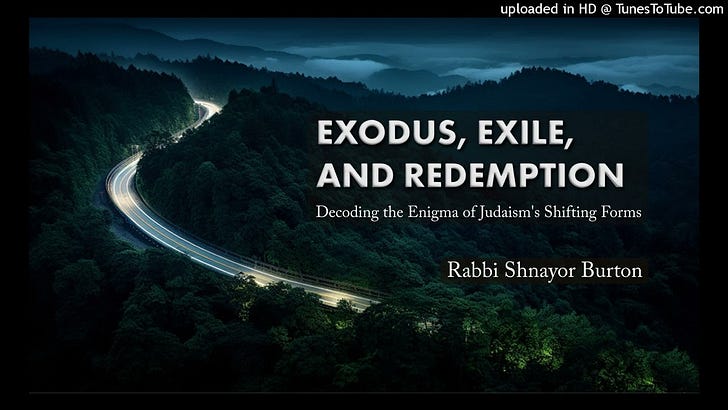EE & R, 3_20: Between the Torah and the Prophets: Yaakov’s Imperfection Reconsidered
← Prev | Table of Contents | Next →
3. Between the Torah & the Prophets – Can Man Truly Know Hashem?
This chapter builds upon many of the ideas developed in earlier discussions. Accordingly, the footnotes will frequently reference previous chapters for further context. Readers are encouraged to revisit those sections as needed.
We previously encountered the prophets’ unflinching criticism of Yaakov, highlighting the apparent shortcomings of the tsaddik. But now, equipped with greater knowledge and a deeper grasp of his role, we are better positioned to reconsider these supposed flaws in the third patriarch of Judaism. What the prophets – those great preachers of Knowledge – regard as deficiencies must be reassessed in the light of the Torah, which teaches Unknowledge, for imperfection itself becomes perfection if falling short is humanity’s inevitable condition.
Let us briefly review Yaakov’s record. Yaakov responded to Hashem’s offer of knowledge with an expression of doubt, saying “I did not know” (Genesis 28:16).1 This statement, made en route to exile, echoes the words of Pharaoh, the wicked king of exile, who said "Who is Hashem... I do not know Hashem" (Exodus 5:2).2 This was the root sin that caused Yaakov to fear Esau’s approach3 – for only those who know Hashem can be certain of His ways.4 Yaakov’s deficiency in knowledge manifested in his imperfect integrity and honesty:5 He acquired his wealth through reliance on toil rather than clear mind and divine wisdom,6 and he met Laban’s deceit with deception of his own.7 Burdened by impure wealth, he found himself unable to fulfill his vow to build the house of Hashem.8
This all seems quite damning, as the prophets relentlessly emphasized. But from the perspective of the Torah’s teaching – of which Yaakov is a foundation – these “shortcomings” are revealed as necessary, crucial to the fulfillment of Yaakov’s divine role.
Let us reconsider his path in light of this understanding. “I did not know” – this statement is the essence of the Torah. With this utterance, Yaakov aligned himself with exile toward which he was journeying, the perilous domain of Unknowledge. Just as Avraham responded to the distant promise of the Land with doubt and earned exile, and just as Moshe’s mission to reveal Torah to Israel began with a deepening of their suffering in exile, so too was Yaakov’s descent into uncertainty a necessary stage in the divine process, which harnesses ignorance and suffering, even denial, as instruments of its fulfillment.
In his fear that the ways of Hashem are inscrutable and the future unpredictable – rooted in the deficiency of lacking Knowledge – Yaakov anticipated the great truth that Moshe would later develop, the very foundation upon which the Torah would rest. And in light of the Law, Yaakov’s behavior toward Laban, judged unethical by the prophets’ standards, emerges as righteous and just. Recall that Yaakov acted with deceit only because Laban himself was a deceitful person, which makes his actions just, for the crooked deserve to be dealt with crookedly.9 The criticism directed against Yaakov, then, is not that he acted outside the bounds of the Law – for within its framework, his actions were entirely justified – but that in doing so, he endangered his inner character. The way a man acts inevitably shapes who he becomes, and by engaging in deception, even lawfully, Yaakov risked internalizing it. This concern – the deformation of the soul – belongs to the prophets, not the Law. The Law governs deeds, not hearts; it demands justice, not virtue. Thus, while the prophets judge Yaakov for what he became, the Torah affirms him for what he did.
Rightly, according to the Torah’s paradigm, did Yaakov celebrate toil instead of the chimera of divine wisdom.10 For finite man is indeed alone, separate from the infinite realm of God,11 the goodness he generates the product of his own ingenuity and labor, which he can then offer back to God in sacrifice.12 And more terrifying still: Alone, man has no way to purify his heart through standing before the God13 who is wholly distant, utterly inscrutable, and devoid of all likeness to him. And yet, this condition shaped Yaakov’s destiny. His journey was not a deviation, but the very path carved for him by the divine plan. In exile, he embraced Unknowledge, and in doing so, became a foundation of the Torah, called upon at the commencement of Moshe’s historic mission:
I am Hashem. And I appeared to Avraham, to Yitzchak and to Yaakov as El Shaddai, but by my Name Hashem I was not known to them… (Exodus 6:2-3)
← Prev | Table of Contents | Next →



Yaakov said (past tense) “did not know”.
Pharoah said (present tense) “do not know”
With Jacob, it was an apology, like oh my goodness! Amazing. I had no idea this was here!
Whereas, with Pharoah, it was contempt, scorn, ridicule. Like who is that! It doesn’t matter to me! I’m the ruler! I control everything!